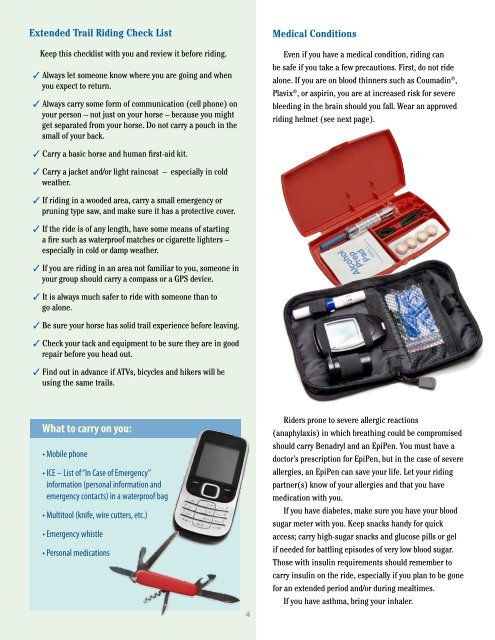Horse Related Injury Brochure - Alberta Equestrian Federation
Horse Related Injury Brochure - Alberta Equestrian Federation
Horse Related Injury Brochure - Alberta Equestrian Federation
You also want an ePaper? Increase the reach of your titles
YUMPU automatically turns print PDFs into web optimized ePapers that Google loves.
Extended Trail Riding Check List<br />
Keep this checklist with you and review it before riding.<br />
3 Always let someone know where you are going and when<br />
you expect to return.<br />
3 Always carry some form of communication (cell phone) on<br />
your person – not just on your horse – because you might<br />
get separated from your horse. Do not carry a pouch in the<br />
small of your back.<br />
Medical Conditions<br />
Even if you have a medical condition, riding can<br />
be safe if you take a few precautions. First, do not ride<br />
alone. If you are on blood thinners such as Coumadin ® ,<br />
Plavix ® , or aspirin, you are at increased risk for severe<br />
bleeding in the brain should you fall. Wear an approved<br />
riding helmet (see next page).<br />
3 Carry a basic horse and human first-aid kit.<br />
3 Carry a jacket and/or light raincoat – especially in cold<br />
weather.<br />
3 If riding in a wooded area, carry a small emergency or<br />
pruning type saw, and make sure it has a protective cover.<br />
3 If the ride is of any length, have some means of starting<br />
a fire such as waterproof matches or cigarette lighters –<br />
especially in cold or damp weather.<br />
3 If you are riding in an area not familiar to you, someone in<br />
your group should carry a compass or a GPS device.<br />
3 It is always much safer to ride with someone than to<br />
go alone.<br />
3 Be sure your horse has solid trail experience before leaving.<br />
3 Check your tack and equipment to be sure they are in good<br />
repair before you head out.<br />
3 Find out in advance if ATVs, bicycles and hikers will be<br />
using the same trails.<br />
What to carry on you:<br />
• Mobile phone<br />
• ICE – List of “In Case of Emergency”<br />
information (personal information and<br />
emergency contacts) in a waterproof bag<br />
• Multitool (knife, wire cutters, etc.)<br />
• Emergency whistle<br />
• Personal medications<br />
4<br />
Riders prone to severe allergic reactions<br />
(anaphylaxis) in which breathing could be compromised<br />
should carry Benadryl and an EpiPen. You must have a<br />
doctor’s prescription for EpiPen, but in the case of severe<br />
allergies, an EpiPen can save your life. Let your riding<br />
partner(s) know of your allergies and that you have<br />
medication with you.<br />
If you have diabetes, make sure you have your blood<br />
sugar meter with you. Keep snacks handy for quick<br />
access; carry high-sugar snacks and glucose pills or gel<br />
if needed for battling episodes of very low blood sugar.<br />
Those with insulin requirements should remember to<br />
carry insulin on the ride, especially if you plan to be gone<br />
for an extended period and/or during mealtimes.<br />
If you have asthma, bring your inhaler.


